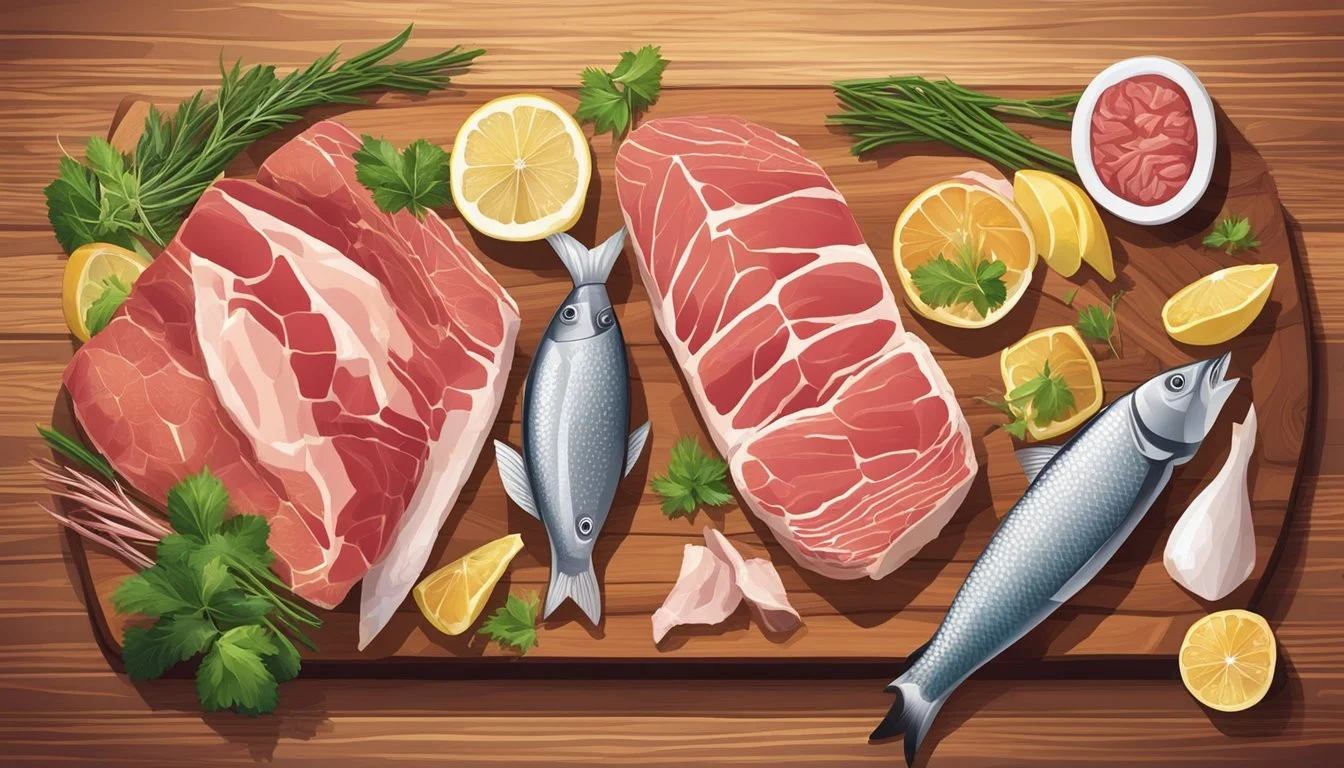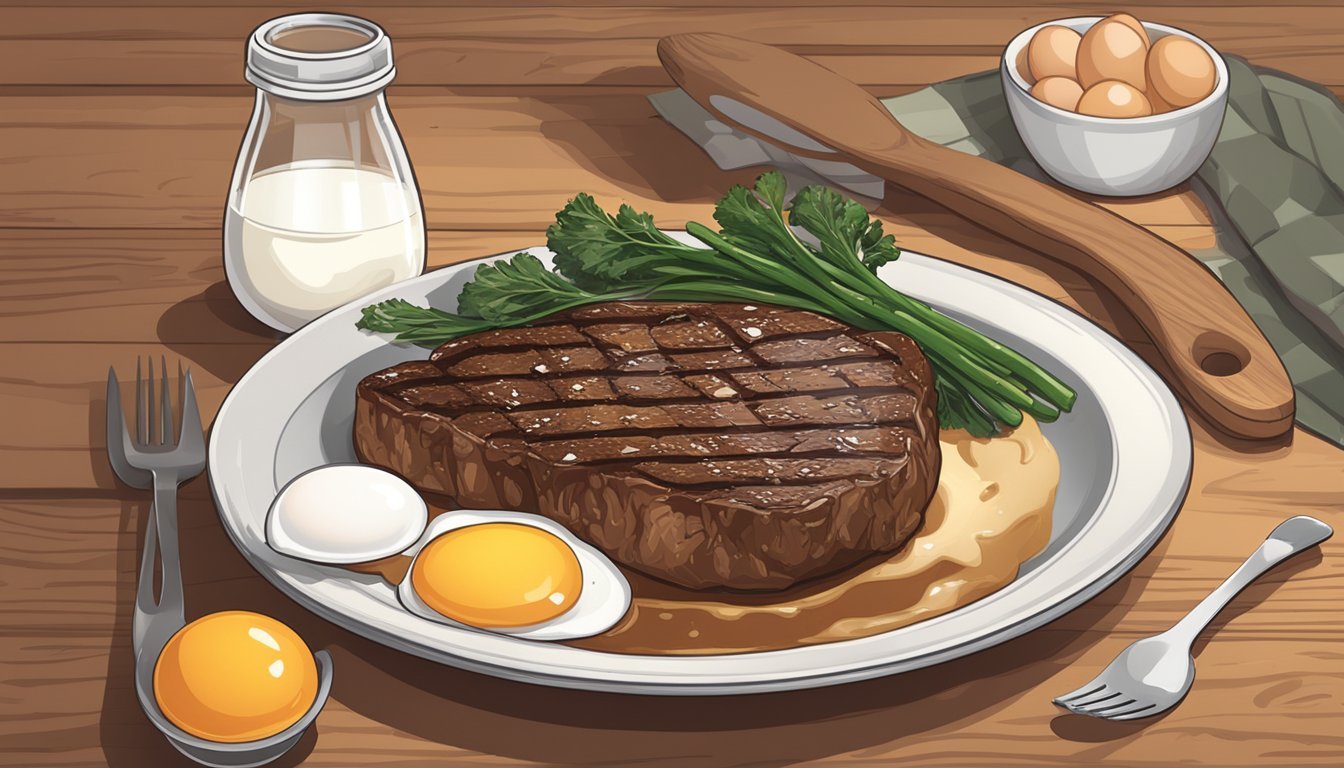Carnivore Diet and Nail Health
Unveiling the Connection
The state of one's nails can often be a telltale sign of their overall health. Nails, reflecting the body's internal well-being, can signal nutritional imbalances or the positive impact of dietary changes. In this context, the carnivore diet, consisting exclusively of animal products, has been reported by some individuals to influence nail health. This diet, marked by its elimination of plant-based foods, emphasizes the consumption of meats, fish, and other animal products, providing a high-protein intake that may contribute to nail strength and repair.
As the carnivore diet gains attention, so does the scrutiny of its health impacts. Nails, comprised of protein, particularly a hardened form known as keratin, may benefit from the protein-centric nature of the diet. Adequate protein intake is crucial for the production of keratin, which can lead to stronger and potentially healthier nails. While anecdotal evidence suggests improvements in nail appearance and strength on a carnivore diet—such as a reduction in fungal concerns and increased robustness—scientific understanding remains limited on the topic.
Balancing a diet for optimal nail health involves more than just focusing on protein. Nutrients such as calcium, magnesium, and certain vitamins typically found in a variety of food groups contribute to maintaining the integrity of nails. Any dietary regimen, including the carnivore diet, must be evaluated for its potential to provide these essential nutrients or the need for supplementation. Thus, exploring the support the carnivore diet may offer to nail health necessarily involves considering the complex nutritional needs that nails present for their best condition.
Fundamentals of the Carnivore Diet
The carnivore diet emphasizes animal-based foods and excludes plant-based items, focusing on high protein and fat intake, aiming to provide essential nutrients.
Core Principles and Foods
At its core, the carnivore diet consists exclusively of animal products.
Meat: This forms the foundation of the diet, including red meat like beef and lamb, as well as pork and poultry.
Fish: All types of seafood are permitted, expanding the diet's range of nutrients.
Eggs: Recognized for their high-quality protein and versatility in meals.
Animal Fats: Include suet, lard, and tallow, providing a rich source of energy.
The inclusion of organ meats is also encouraged due to their high vitamin and mineral content.
Nutritional Profile
The diet is high in proteins and fats, two macronutrients essential for muscle maintenance, hormone production, and overall health.
Vitamins and Minerals: The diet's focus on meat and organ meats provides a dense source of vitamins and minerals, including but not limited to:
Vitamin B12: Crucial for red blood cell formation and neurological function, predominantly found in meat.
Iron: Particularly high in red meat, essential for transporting oxygen in the blood.
Zinc: Found in meat and seafood, important for immune function and metabolism.
Despite its nutrient density, critics of the diet note the potential for deficiencies in fiber and certain vitamins typically found in plant-based sources, such as vitamin C. Therefore, individuals on the carnivore diet should be mindful of the balance and variety within the permissible foods to ensure adequate intake of all essential nutrients.
Health Benefits and Risks
The Carnivore Diet, focused purely on animal-based foods, has been associated with various health benefits and risks, particularly in the context of weight management, heart health, digestive impact, and chronic diseases.
Weight Management
Consuming a Carnivore Diet can lead to weight loss as it typically reduces carbohydrate intake which, for some individuals, may result in short-term fat loss. However, the diet's high protein and fat content might not be sustainable or balanced for long-term weight management.
Pros:
May reduce appetite due to high protein content.
Potential for quick, short-term weight loss.
Cons:
Lack of dietary fiber can affect satiety and long-term weight control.
Sustainability concerns due to restrictive nature.
Heart Health
Cholesterol levels and heart disease risk are critical considerations. The diet is rich in saturated fats, which may increase LDL cholesterol levels in some individuals, potentially raising heart disease risk.
Pros:
Some proponents report improved lipid profiles.
Cons:
Elevated risk of heart disease due to increased saturated fat intake.
Limited variety of heart-healthy nutrients from plant sources.
Digestive Impact
The diet's exclusion of plants can result in a lack of dietary fiber, leading to constipation and other digestive issues. On the other hand, some individuals may experience reduced inflammation and digestive discomfort without plant-based foods.
Pros:
Some individuals find reduced bloating and digestive discomfort.
Cons:
Increased risk of constipation due to zero fiber intake.
Potential for gut microbiota imbalance.
Chronic Diseases
A diet lacking in plant diversity can contribute to an increased risk of certain chronic diseases due to deficiencies in essential nutrients. Conversely, its potential anti-inflammatory effects might reduce symptoms of specific chronic conditions.
Pros:
May alleviate symptoms of certain autoimmune conditions.
Cons:
Potential nutrient deficiencies could contribute to chronic disease.
Long-term health effects are not well-documented.
While the Carnivore Diet may positively affect nail health due to its high protein content, its overall implications should be weighed carefully, considering both the benefits and risks to one's health.
Nail Health and Nutrition
Adequate nutrition is paramount for maintaining the structural integrity of nails, as they are predominantly composed of keratin, a protein that depends on specific vitamins and minerals for its formation and maintenance. Key nutrients such as biotin, also known as vitamin H, play a crucial role in cell growth, affecting the health of nails directly.
Importance of Keratin and Biotin
Keratin is the primary structural protein that makes up nails, hair, and the outer layer of skin. Its production requires an array of nutrients, particularly biotin. Biotin, a B-vitamin also referred to as vitamin H, is fundamental for efficient cell proliferation and supports the development of keratin. Deficiency in biotin can lead to weakened nails, hair loss, and other dermatological issues.
Daily Biotin Recommendations:
Adults: 30-100 mcg
Sources of Biotin:
Meat, especially organ meats like liver
Eggs, particularly the yolk
Nuts, such as almonds and peanuts
Dairy products like milk and cheese
Role of Vitamins and Minerals
Vitamins and minerals are vital for nail health, aiding in the prevention of brittleness, splitting, and other abnormalities.
Zinc: It supports the growth and development of nails by contributing to protein synthesis and immune function.
Recommended intake: 8 mg (women), 11 mg (men)
Additional Nutrients Essential for Nail Health:
Omega-3 fatty acids: Found in fatty fish, these fats are beneficial for nail health due to their anti-inflammatory properties, which support nail bed health.
Fat: While excess dietary fat is often discouraged, certain fats are essential. These include omega-3 fatty acids, which lubricate the nail bed and improve nail health.
Protein: Regarded as the building block of the body, protein is vital for keratin production and, consequently, for strong, healthy nails. Lean meats, poultry, fish, legumes, and dairy are all good sources of dietary protein.
Ensuring a balanced diet with adequate protein, fats, vitamins, and minerals is essential for maintaining healthy nails.
Comparative Analysis
This section provides a focused examination of how the Carnivore Diet influences nail health, especially when contrasted with Plant-Based and other Low-Carb diets.
Plant-Based vs. Carnivore Diets
Plant-Based Diets traditionally include a variety of fiber-rich vegetables, grains, legumes, nuts, and seeds. These foods are known for their antioxidant properties and often have an anti-inflammatory effect on the body. Such diets can support nail health by providing essential nutrients that are vital for maintaining nail structure and growth.
In contrast, the Carnivore Diet consists solely of animal products and eliminates the mentioned plant-based foods, which can influence nail health differently. While the Carnivore Diet lacks fiber, it's typically rich in protein and certain nutrients which are directly beneficial for nail health, such as zinc and biotin.
Carnivore Diet and Other Low-Carb Diets
Ketogenic and other Low-Carb Diets differ from the Carnivore Diet in their inclusion of a wider variety of foods, yet they all reduce carbohydrate intake. Where ketogenic diets advocate for high-fat, moderate-protein, and low-carbohydrate consumption, the Carnivore Diet focuses primarily on high protein intake.
The effect on nail health in a low-carb context may include improved strength and reduced brittleness when an adequate intake of protein and essential fats is maintained. However, the long-term implications of the lack of dietary fiber and antioxidants found in plant-based foods on overall health and, consequently, nail health are worth considering.
Potential Health Concerns
While exploring the carnivore diet and its impact on nail health, individuals need to consider several health concerns. This section will address the potential nutritional deficiencies and long-term health effects associated with this diet.
Nutritional Deficiencies
The carnivore diet consists exclusively of animal products, which raises concerns about a lack of dietary fiber and a variety of essential nutrients.
Fiber: Animal products do not contain fiber. A zero-fiber diet can lead to issues with blood sugar regulation and increase the risk of colon cancer.
Vitamins: The absence of fruits and vegetables can result in deficiencies of vitamins such as C and E.
Minerals: A limited intake of certain minerals that are easily obtained from plant sources might occur.
Long-Term Health Effects
Focusing solely on animal products may lead to potential long-term health issues.
Saturated Fat: High intake of saturated fat, common in animal foods, could be associated with an increased risk of heart disease.
Risks: By not consuming a balanced diet that includes a variety of food groups, one might heighten their risk for health issues including nutritional deficiencies and chronic diseases.
Lifestyle and Adjustment
Transitioning to a carnivore diet involves significant lifestyle changes and requires a disciplined approach to achieve the intended benefits such as increased energy levels. Individuals should consult healthcare professionals to tailor the diet to their specific needs.
Implementing the Carnivore Diet
Starting the Diet: Individuals considering the carnivore diet should ease into it gradually. This approach allows the body to adjust to the new way of eating, which is restrictive by eliminating all plant-based foods. An example of a starter plan could be:
Week 1-2: Introduce primary meat sources like beef, chicken, and fish while reducing plant-based foods.
Week 3-4: Incorporate organ meats for nutrient diversity, and phase out remaining plant-based foods.
Consulting Professionals: Prior to making this dietary change, it's advisable for individuals to seek guidance from a healthcare professional. This step ensures that the diet aligns with their health status and nutritional needs.
Managing Side Effects
Identifying Common Issues: Transitioning to a carnivore diet can lead to side effects such as stress, digestive changes, and anxiety due to the body's adaptation to a new energy source. Monitoring these symptoms is vital for a successful dietary change.
Digestive Stress: Symptoms like bloating or changes in bowel movements may occur. These should be expected and often resolve as the body adapts.
Mental Clarity: Some individuals report initial changes in mood or cognitive function, which can stabilize over time.
Mitigating Negative Effects: To minimize side effects, maintaining hydration, getting adequate sleep, and ensuring a balanced intake of meats rich in fat and protein can be helpful. Continuous communication with a healthcare professional enables individualized adjustments for better management of the diet's impact.
Carnivore Diet in Practice
The Carnivore Diet strictly focuses on animal products, excluding all forms of carbohydrates and plant-based foods. It emphasizes the consumption of a variety of meats and other animal-derived products to meet nutritional needs.
Sample Meal Plans
Day 1:
Breakfast: Scrambled eggs with slices of smoked salmon
Lunch: Grilled mackerel with a side of bone broth
Dinner: Pan-seared beef steak with a side of sautéed chicken liver
Day 2:
Breakfast: Pork sausages (What wine goes well with pork sausages?) and boiled eggs
Lunch: Lamb chops and chicken hearts
Dinner: Sardines and a cup of bone broth
Day 3:
Breakfast: Beef liver pâté spread over pork rinds
Lunch: Chicken thighs (What wine goes well with chicken thighs?) with a side of homemade pork bone broth
Dinner: Grilled salmon (What wine goes well with grilled salmon?)with a side of beef marrow bones
Sourcing Quality Meats
Consumers should prioritize the quality of meats and other animal products, as this can significantly affect the health benefits of the diet.
Beef: Grass-fed and finished beef is preferred for its higher nutrient content, including essential fatty acids and vitamins.
Salmon and Mackerel: Seek out wild-caught salmon and mackerel to avoid contaminants and benefit from higher levels of omega-3 fatty acids.
Lamb and Pork: It's beneficial to source pasture-raised lamb and pork for better nutritional profiles and ethical farming practices.
Chicken: Free-range or organic chicken is recommended to reduce exposure to antibiotics and hormones.
Organ Meats: Organ meats, such as liver, heart, and kidney, should be procured from trusted butchers to ensure they are fresh and properly handled.
Sardines: Opt for sardines packed in water or olive oil and certified as sustainably caught.
Bone Broth: Homemade bone broth, made from the bones of grass-fed animals, maximizes nutrient intake and minimizes processed additives.
Other Animal Products: For dairy and eggs included in the diet, sources should ideally be pasture-raised or organic to ensure higher quality and nutritional value.
Selecting a range of meats and products, sourced from ethical and high-quality providers, can help individuals practice the carnivore diet effectively, potentially improving overall health and wellness, including nail health.
Scientific Evidence and Research
Current discussions around the carnivore diet and its effects on health often involve consideration of specific aspects such as nail health. Through scientific research, one can analyze the implications of this dietary pattern on such physiological details.
Studies on Nail Health
To date, there has been a limited amount of dedicated research directly correlating the carnivore diet to nail health. While nourishment and nail health have a shared bond, studies specifically examining the impact of an all-meat diet are sparse. Important components of nails, such as keratin, could benefit from the high protein content in a carnivore diet, but an unbalanced intake of nutrients might lead to deficits that could impair nail strength and growth. Research does show, however, that certain nutrient deficiencies—particularly in vitamins and minerals that are less abundant in meat-only diets—can have a detrimental effect on nail health.
Carnivore Diet Advocates
Proponents, such as Dr. Shawn Baker, an orthopedic surgeon and a known advocate of the carnivore diet, claim that the diet can lead to improved overall health outcomes. They often cite anecdotal evidence of better skin, hair, and nail health among the benefits. However, there is a paucity of peer-reviewed scientific evidence to support these specific claims. It is important to consider that while anecdotal reports exist, they do not replace controlled, scientific studies. Supporters often point to ancestral eating patterns and evolutionary biology as underlying reasons for the purported effectiveness of the carnivore diet. Nonetheless, the diet's notably high levels of saturated fats and potential impact on LDL cholesterol remain a concern. Some observational studies have linked high intake of red and processed meats with increased risks of conditions such as type 2 diabetes and high blood pressure, which in turn could indirectly affect nail health.
Consulting Healthcare Professionals
Before embarking on the carnivore diet, individuals should consult healthcare professionals to ensure they maintain a balanced diet that supports nail health. Healthcare professionals, including registered dietitians, can provide vital insights into the nutritional needs specific to maintaining strong and healthy nails.
The carnivore diet, due to its exclusion of plant-based foods, might not provide all the essential vitamins and minerals necessary for optimal nail health. Especially important are:
Protein: A building block for nail growth.
Iron: Prevents brittle nails.
Zinc: Aids in nail strength.
Vitamin C: Supports collagen production vital for nail integrity.
One must consider that excluding certain food groups can have wide-ranging impacts on health. A healthcare professional can provide a nutritional assessment and advice on supplementation or diet adjustments to mitigate potential deficiencies.
Role of Registered Dietitians:
Assess dietary history.
Tailor nutritional advice to support nail health.
Suggest dietary modifications or supplements.
Monitor health and dietary impacts over time.
It is essential to understand that while pursuing health improvements through dietary changes, maintaining a nutritious balance tailored to one's individual needs is crucial. Consulting with a healthcare professional can safeguard against unintended consequences on health, ensuring that any dietary approach, whether it be a carnivore diet or another regimen, aligns with one's overall wellness goals, including the maintenance of strong, healthy nails.
Conclusion
The carnivore diet focuses on animal products and often results in a high intake of protein, which can be beneficial for nail health, as protein is a key component of keratin, the substance that nails are made of. Additionally, an increased intake of certain vitamins and minerals from meat, such as iron and vitamin B12, may contribute to stronger nails.
However, the absence of plant-based foods may lead to deficiencies in certain vitamins and minerals, such as biotin, calcium, and magnesium, which are also essential for maintaining strong and healthy nails. Individuals considering the carnivore diet should monitor their nail health as it can reflect changes in their overall health.
Adequate hydration and attention to potential nutritional gaps are crucial. They should ensure that they are obtaining all necessary nutrients either through their diet or supplementation. Regular observation by healthcare providers is advisable for those who choose to follow this diet, to prevent potential deficiencies and ensure that the diet does not adversely affect their nail or overall health.
In summary, while the carnivore diet may have positive effects on one's nails due to high protein intake, there is a need for careful planning to avoid nutritional deficiencies that could detract from these benefits.











